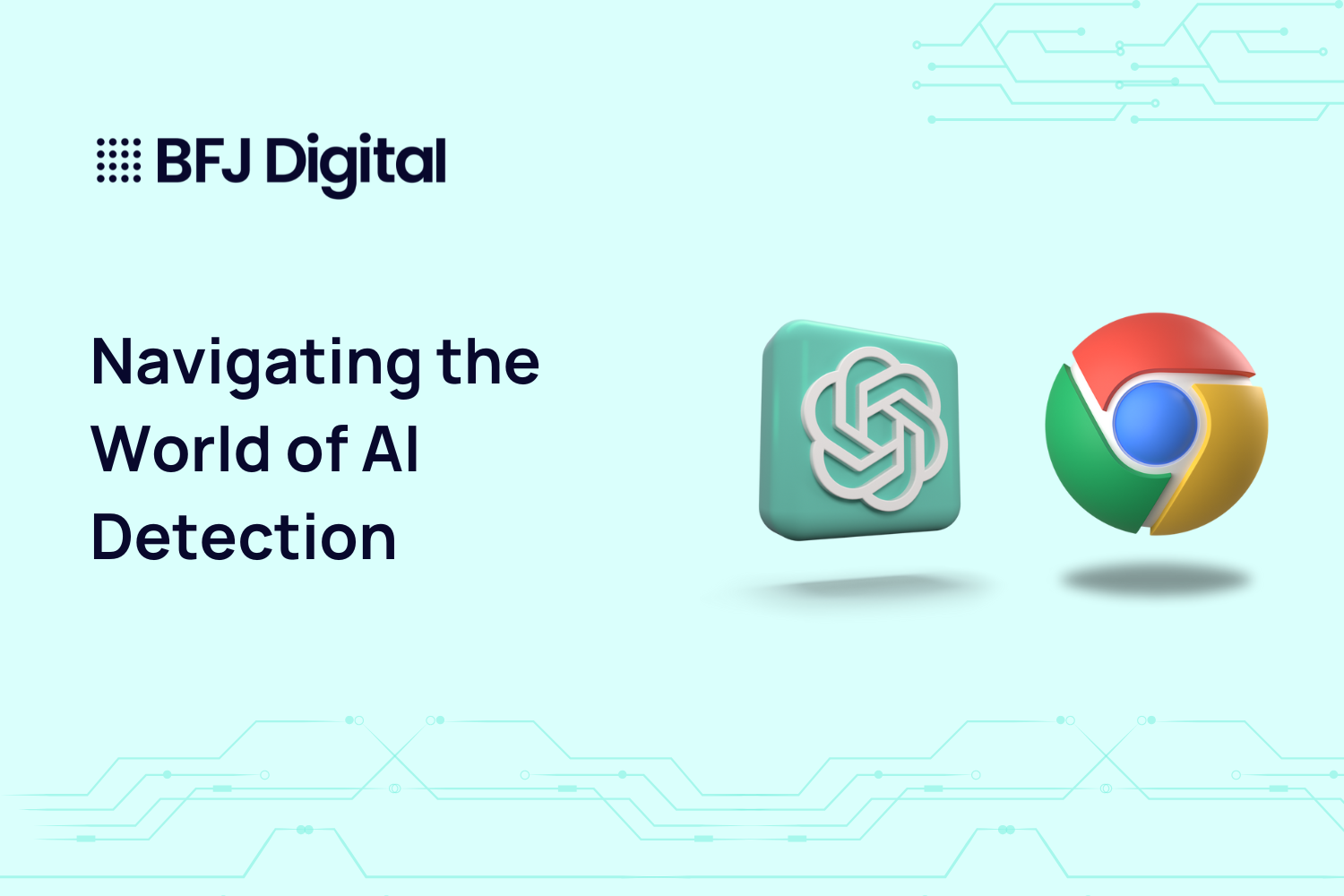Navigating the World of AI Detection

Table of Contents
Table of Contents
With artificial intelligence revolutionising content creation, the ability to discern between AI-generated and human-crafted material has grown increasingly vital. It’s not just about authenticity; it’s a game-changer for maintaining quality, originality, and trust in the digital sphere.
This blog delves into AI content detection and how they work, guiding you to spot the subtle signs of machine-written text. It’s a blend of art and science, essential for maintaining authenticity in our online interactions.
- The Importance of AI Detection
- Are There Penalties for AI generated content On Your Website?
- Google’s Preference, AI Generated vs Human
- Does Google Have Their Own AI detection?
- Different Ways To Detect AI-Generated Content
- 7 Top AI Content Detectors
- How BFJ Approaches AI Content Detection
The Importance of AI Detection
AI detectors, they’re more than just digital gatekeepers verifying the authenticity of content. In the world of academia, their role is pivotal. They stand guard against plagiarism, ensuring that scholarly work remains true to its core purpose – the pursuit of knowledge and original thought. It’s not just about catching copycats; it’s about nurturing a culture of academic integrity.
And then, there’s the web. Here, AI detectors are the unsung heroes maintaining the quality of what we read and interact with daily. They’re like linguistic landscapers, trimming away AI-generated content that might otherwise blend into our digital ecosystem. By spotting unnatural patterns and repetitive phrasing, they ensure that what we consume online is not just a string of well-crafted sentences, but content with a human touch.
Take AI tools like ChatGPT, for example. They’ve simplified the way we interact with technology, transforming complex queries into coherent, often satisfying results. Unlike traditional search engines that merely point to possible answers, AI like ChatGPT takes a leap further, crafting responses and completing tasks based on the prompts given.
This ease of use brings a unique challenge for businesses. Writers, be they in-house copywriters or external freelancers, might lean on AI tools for content creation. Over 15% of writers already do, enhancing their work with AI’s capabilities. But here’s the rub: AI-generated articles might miss the mark on accuracy, originality, or even veer into plagiarism. It’s vital for businesses to ensure that their content remains fresh, relevant, and distinctively theirs.
On the flip side, AI’s not all about potential pitfalls. When used wisely, it can supercharge a business’s content strategy. It’s about balancing the scales – leveraging AI to boost content production while keeping a keen eye on quality and uniqueness.
Book a free strategy session today
Book a free session to elevate your online performance. Save time and costs with our comprehensive, streamlined approach.
- Meet with a strategy specialist to build a growth plan.
- Increase your media performance by up to 200%
- Improve business efficiencies to increase ROI via automation and increase profit
- We cut to the chase. What digital marketing is actually working?
Table of Contents
Are There Penalties for AI generated content On Your Website?
So, you’re wondering about penalties for AI content on your website, right? Here’s the thing – it’s not black and white. Direct penalties for AI content per se aren’t clearly outlined by the digital overlords. But, and it’s a big but, the real impact lies in how it skews your audience’s perception and, potentially, how search engines view your site.
Imagine this: your website is brimming with content, but if a chunk of it is AI-generated, you might be skating on thin ice. It’s not just about dodging penalties; it’s about trust, relevance, and user experience. If your content feels repetitive, lacks depth, or just doesn’t quite resonate, it doesn’t just turn off your audience – it could also send red flags to search algorithms that are getting smarter at sniffing out AI footprints.
Google’s Preference, AI Generated vs Human
Google’s take? It’s somewhat simple. When they are judging content, whether it’s written by AI or a human, the text must help the reader with what they’re searching for. Google has expressed that “Using automation—including AI—to generate content with the primary purpose of manipulating ranking in search results is a violation of our spam policies.” which you can read in that link. This indicates that if your AI content isn’t correctly optimised for SEO, it will be penalised. Additionally, Google has advised content creators that your content has to be people-first content, demonstrating qualities E-E-A-T. These qualities stand for experience, expertise, authoritativeness, and trustworthiness. For Google’s first hand article, click here. While this is Google’s public stance on AI generated content, John Mueller does have his concerns of authenticity, stating:
“If you had an important legal case, would you want your lawyer to use chat gpt and Google translate to make the argument before the judge?”
With John’s widely known expertise in the space, it should be a deep consideration on what aspect of content you’re generating, always leaning back on the E-E-A-T qualities to ensure you’re genuinely helping the reader.
Does Google Have Their Own AI detection?
Now, onto the big question: Can Google, the search engine titan, detect if your content is AI’s handiwork? Officially, they haven’t waved a flag saying they can. But let’s remember. Google’s algorithms are like fine wine – they get better with time. They’re increasingly adept at picking up nuances, valuing quality, and prioritizing user experience.
While Google might not outrightly penalize AI-generated content, its algorithms are designed to reward content that engages, informs, and resonates with human readers. If your AI-generated content lacks the warmth of human touch or falls short in delivering value, chances are, it might not fare well in the mystical realm of SEO. So, it’s safe to assume that Google’s eyes are getting sharper at distinguishing between content crafted by human minds and those spun by digital intellects.
Source: Link
Different Ways To Detect AI-Generated Content
Navigating the digital world requires a keen eye, especially when it comes to identifying AI-generated content. It’s a bit like detective work, where you’re piecing together clues to unveil the story behind the text. Here are some savvy strategies to help you do just that:
Look for Repetitive or Unusual Patterns in the Text
AI, bless its digital heart, has a penchant for repetition. It’s like a child who’s just learned a new word and wants to use it in every sentence. If you notice certain phrases or ideas circling back like boomerangs in your content, it might be AI’s handiwork.
Run a Quick AI Query And Compare
Here’s a nifty trick: take a snippet of your text and throw it into an AI query tool. If the results echo your content a little too closely, you might have an AI-created piece on your hands.
Check for Lack of Originality
Originality is the soul of quality content. AI, while efficient, often struggles in the creativity department. If your content feels like a reheated meal – familiar and unexciting – it might be time to question its origins.
Review Outdated Inaccuracies
AI isn’t always up to speed with the latest info. It can regurgitate outdated facts without any awareness of recent developments. So, if something in your content smells a bit stale, it could be AI, not staying current.
Perform a Contextual Analysis
Context is king, and AI often abdicates this throne. It can miss the subtleties that give content depth and connection. If your text seems to lack contextual links or feels disjointed, AI might be behind the curtain.
Use an AI Content Detector Tool
When in doubt, turn to the experts – AI content detector tools. These digital Sherlocks are designed to sniff out AI content, using algorithms to spot the telltale signs of non-human creation.
7 Top AI Detection Tools
In the quest to maintain digital authenticity, here’s a roundup of the top 7 AI content detectors, each bringing its unique strengths to the table:
- Copyleaks: A robust AI-powered plagiarism detection tool, Copyleaks excels in ensuring content originality. It scans for duplicates across various databases, supports multiple file formats and languages, and provides detailed similarity reports. Its API integration allows for custom application development, making it a versatile choice for content creators and educational institutions, and offers a free ai detector trial.
- Originality.ai: This tool stands out for its ability to detect duplicate content and measure text uniqueness. It uses machine learning algorithms for comprehensive content analysis, offering in-depth similarity reports and content optimization features. It’s user-friendly and provides actionable insights to improve writing quality, making it ideal for writers and educators (Unite.AI, Writesonic, Edureka).
- AI Detector Pro: Focused on detecting AI-generated content from popular AI content generation tools like ChatGPT and GPT-4, AI Detector Pro provides detailed reports showing evidence of AI generation. It’s user-friendly, offering functionalities like confidence levels for AI-generated text and efficient report management (Unite.AI).
- Content at Scale – AI Detector: This tool specializes in verifying if content is human or AI-generated. It uses natural language processing and a trained AI model to detect patterns indicative of AI-generated text. It provides an AI probability score for content, helping users decide if it meets their requirements (Unite.AI).
- GPTZero: Particularly popular in educational settings, GPTZero is designed to detect AI-generated content by large language models like ChatGPT. It features a user-friendly interface, supports batch file screening, and specializes in detecting content from specific AI models. This tool is a great fit for educators and academic institutions (Writesonic, Retable).
- Writer.com AI content detector: Known for its AI writing assistance, Writer.com also offers AI content detection capabilities. It’s an all-in-one tool that’s user-friendly and provides a free trial for content checks. Ideal for writers, it ensures content is not AI-generated or plagiarized (Writesonic).
- Sapling: Geared towards enhancing the efficiency of customer-facing teams, Sapling integrates with CRMs and messaging platforms to provide real-time suggestions. It’s known for its rich free plan, fast analysis, and accuracy in language model co-piloting, making it valuable for sales and support teams (Retable).
How BFJ Approaches AI Content Detection
AI content detection emerges as a pivotal thread. It’s not just about the mechanics of distinguishing AI-generated text; it’s about safeguarding the authenticity and integrity of content. For BFJ Digital, this resonates deeply with our commitment to delivering strategic and impactful digital marketing solutions. Our focus on data analysis and SEO strategy aligns perfectly with the need for authentic, high-quality content. Employing AI content detectors can enhance existing services, ensuring that the content is not only engaging but also genuine – a cornerstone in building trust and driving effective digital marketing strategies for our clients.

